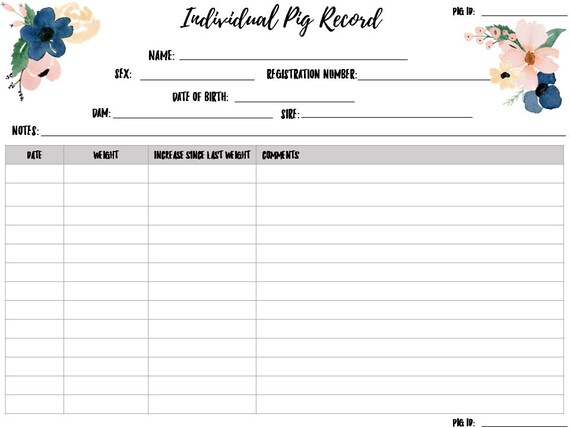
It is important to keep record keeping simple, and to keep records systematic. Broadly speaking, they can be categorized into five major types:Records can be about any performance of the animals, economic development, or any activity of the farmer or veterinarian. There are many challenges that farmers face, ranging from short-term crises to long-term issues. (11-12)Keeping adequate records also provides valuable benchmark information for the farm unit to indicate when a significant change has occurred that may require.Farming can be a risky endeavor. The common practice is to measure the yield in kg using a suitable balance or a bucket or other container calibrated in 0.5 kg intervals. In its simplest form milk recording involves the measurement and recording by the owner of the quantity of milk produced daily by each individual animal.
Let me start with the disclaimer that I am not an attorney, and readers should seek appropriate legal counsel when considering these risks.Record keeping also will help you keep track of your spending , sales and profits from your farm, which will help you when you prepare your income tax return. In this edition of Money Matters, I’ll discuss No. Recordkeeping systems if they include soil-fertility and pest-management inputs.In previous columns, I’ve talked about the first three risks.
In addition, taking these steps can help preserve ground and surface water resources and improve your crop performance.In addition to regulatory compliance, there is the issue of third-party certifications, which may not be required by law but may be mandated by your milk buyer. For assistance in complying, use the many resources that are available to you.A nutrient management plan developed in conjunction with the USDA Natural Resources Conservation Service or a state agency can help you stay on the right side of regulations regarding manure management. Running afoul of environmental regulations can bring major penalties, require costly changes to your farm, and disrupt relationships with your local community. There are many regulations that apply to dairy farms some are general and apply to all businesses, while others are specific to agriculture or dairy farms in particular.Environmental regulations are a significant portion of these. But many of them fall into the following categories: farm regulatory compliance, human resource issues, and liability risk.AgriLife Extensions online Bookstore offers educational information and resources related to our many areas of expertise and programming from agriculture.Regulatory compliance is one of the major categories of legal risk and one that can be difficult to stay on top of. In a family owned and operated farm, or a farm operatedThere are many areas of legal risk on today’s farms, and it’s challenging to cover them all in one article.
But do all your employees share your attitude and adhere to your guidelines and protocols? Poor training or supervision can add risk to your operation.Human resource compliance could be considered “regulatory compliance” as well, but it’s significant enough that it deserves its own category. Animal rights activists and others are out there, looking for poorly run farms to use as examples.Certainly, every dairy farmer I’ve ever interacted with believes in taking excellent care of their animals. You should always run your farm as if someone’s watching — because they may be.
Be sure you’re in compliance with your state’s labor laws — keeping in mind that many states have made recent changes in things such as minimum wage, overtime, paid leave, and other requirements.Immigration law deserves a special mention. Take the time (and consider consulting with your legal counsel) to review your hiring, firing, and other employment practices. The rules can be complex, and it could take only one complaint to bring enforcement to your doorstep.The best course of action is to be proactive in this area.

Here are some of the key steps to keep your farm protected from legal risk:Review the key areas of legal risk. When was the last time you reviewed your insurance coverage with your agent? Has your coverage been updated to reflect changes in your business over time? Are you doing new things that may not be covered under an older policy? Product liability coverage is essential for any farm that is doing value-added processing or direct-to-consumer sales.Managing all these legal risks could be a full-time endeavor and is certainly most farmers’ least favorite part of the job — but don’t put it off. Be sure you have adequate liability coverage in place.Farm operations change over time. Your state farm bureau can be a good resource and give some guidance as to the key trucking compliance issues in your area.Finally, there is general and product liability. Don’t assume that you’re exempt.
Pay particular attention to employment and OSHA/safety compliance. Review your coverage and, if possible, do a walk-through of your operation to see if there are gaps or out-of-date policies that need to be addressed.Review your records. Your farm will be better managed, your workforce safer, and your animals better cared for as a result.Make an appointment with your insurance carrier(s). Don’t allow that accident, that spill, or that violation to occur. The best solution to legal risk is prevention.
Think about these scenarios ahead of time and plan for them versus reacting to them. What would you do in case of a serious on-the-job injury? A manure spill? Are you ready for a visit from ICE or OSHA? What if you’re not there when these occur? Is there someone designated to speak or act in your absence?Don’t wait for a crisis to happen. Be sure to consult legal counsel before making any major changes.Finally, be sure to have concrete plans in place should an emergency occur. Many farms separate their land ownership and operations for these purposes. The formation of an entity or entities could be worth considering for liability protection and can be part of an estate plan, as well.


 0 kommentar(er)
0 kommentar(er)
